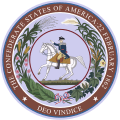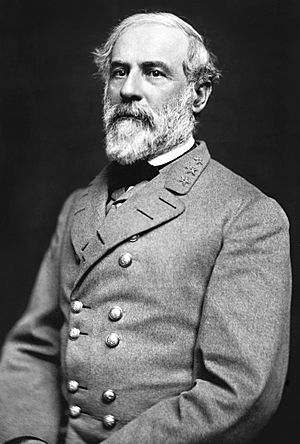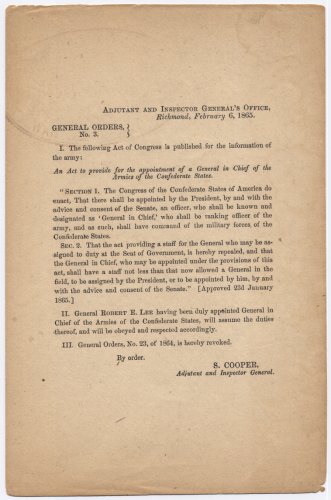General in Chief of the Armies of the Confederate States facts for kids
Quick facts for kids General in Chief of the Armies of the Confederate States |
|
|---|---|

|
|

Seal of the Confederate States (1863–1865)
|
|
| The War Department | |
| Style | General |
| Reports to | The president The secretary of war |
| Appointer | The president
with Senate advice and consent
|
| Term length | No fixed term |
| Formation | January 31, 1865 |
| Abolished | April 9, 1865 (de facto) |
The General in Chief of the Armies of the Confederate States was a very important military leader. This role was created near the end of the American Civil War. It existed from January to April 1865. General Robert E. Lee held this position. He was the main military commander for the Confederate States Army.
The role ended when General Lee surrendered to the Union Army at Appomattox, Virginia, on April 9, 1865. Even though he was "General in Chief," it was more about his job duties. The highest-ranking general was actually Samuel Cooper, based on how long they had served.
The Role of General in Chief
The position of General in Chief was created on January 31, 1865. This happened during the 2nd Confederate States Congress. Their goal was to have one main commander for all Confederate armies.
General Robert E. Lee was chosen for this role on February 6, 1865. He served as General in Chief until the American Civil War ended. Lee also kept his command of the Army of Northern Virginia. He managed both important jobs until his surrender on April 9, 1865.
Why the Position Was Created
The idea of a General in Chief was discussed much earlier. It came up in February 1862. However, President Jefferson Davis did not agree with it. He believed that such a general might command armies without his approval.
President Davis often handled many of the duties of a General in Chief himself. He acted as both a military planner and the main commander. Other generals, like Lee (from March to May 1862) and Braxton Bragg (from February 1864 to January 1865), also helped. They advised President Davis on military operations.
See also
 | Ernest Everett Just |
 | Mary Jackson |
 | Emmett Chappelle |
 | Marie Maynard Daly |



